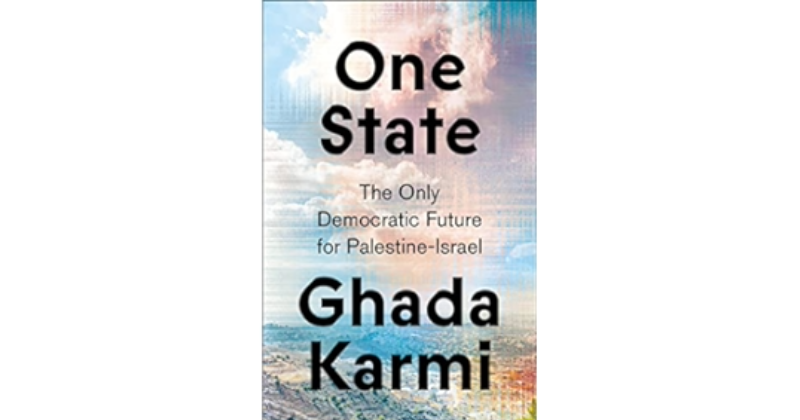

By Urte March
Ghada Karmi, a London-based Palestinian academic whose family fled the Nakba when she was a young child, has written a new book which bills itself as a ‘common sense argument for a one state solution’.
The first half of the book is a potted intellectual and social history of Zionism and the development of the Israeli-Palestinian conflict. It sets out why the Israeli state is no spontaneous historical development within the Middle East, but rather a settler-colonial project which could only be created with Western military and political support. Violent displacement of the indigenous population is integral rather than ancillary to its project. There is a discussion of how an ethnic-national concept developed within European Jewry which created a universal historical identity for all Jews, at odds with previous conceptions of Judaism as religious belief or social sub-group embedded in local cultures.
Israel’s strategy to divide and play the Arab states off against each other is described as a factor contributing to the growth of an array of radical non-state groups opposing Israel and its backers, as is the evolution of the PLO towards acceptance of Israeli sovereignty and a two-state settlement largely on Israel’s terms. Karmi correctly emphasises the importance of the right of return for displaced refugees as a fundamental demand for Palestinians, without which there can be no talk of justice, national rights, nor a durable settlement to the conflict.
Those familiar with the historical myths commonly debunked by the pro-Palestine movement will not find much novel material in this part of the book, but it may serve as a helpful arsenal of argument for a new generation of pro-Palestine activists. There are, as Karmi points out, increasingly more of them; surveys show that more young people support the Palestinian cause than ever, and even in the ranks of the American elite, it is becoming more common to openly support Palestine (24 members of Congress did so during the crisis in 2021).
Karmi’s own argument appears mainly in one long chapter on the one state solution, where she states that activists must start from a consideration of what a just and durable settlement in Palestine might be, regardless of how feasible it seems today. She takes the reader through various possible forms of a two-state solution and alternative proposals such as annexation to Jordan, demonstrating why each one is unviable and unjust.
The Zionist imperative to create a Jewish majority by further expulsions and exclusions drives its continued expansion, making it impossible that Israel will accept the Palestinian right of return. The jigsaw puzzle of non-contiguous Palestinian territories, whose borders are entirely under Israeli control, couldn’t possibly support the right of return without Israeli withdrawal. In effect, Palestine has no genuine sovereignty and is under Israeli control; one state is a reality in all but name.
Therefore, Karmi concludes, the only hope is for everyone to learn to live together. She calls for a single, democratic, secular state and for a global South Africa style anti-apartheid struggle to win hearts and minds. She identifies the Palestinian Authority as an agent of change in Palestine, if it can give up the fantasy of governing an effectively non-existent Palestinian state and transform itself into a ‘campaigning body that leads the equal rights project’. Although she stops short of saying so openly, this would mean Palestinians abandoning their struggle for a Palestinian state and accepting Israeli authority – at least until any civil rights victories are won. This is a fundamentally liberal strategy.
A breakthrough in such a campaign – as Kami recognises – would require overcoming the same key barrier facing the two-state solution: convincing Israel to abandon its claim to being an exclusively Jewish state (the very basis of Zionism) and Israeli Jews to relinquish the very real material privileges their status in Israel provides. Since the United States is the only power able to hold Israel to account, it would first require reversing entrenched US support for a Zionist state, something Karmi understatedly acknowledges would take ‘considerable effort’.
Even though this strategy would certainly require a mass movement not just among Palestinians but among Israeli Jews and Americans, there is no real discussion of Palestinian-Jewish solidarity, the role of similar movements in the other Arab states, or the socio-economic dynamics of American imperialism and its support for Israel. Karmi seems to place little emphasis on the agency of the Palestinain people, particularly the working class in this struggle – the Palestinian Authority and international authors and intellectuals are the only forces openly identified as being key to taking forward the struggle.
Perhaps that is because any deeper discussion of a roadmap to one state would quickly lead to an analysis of the social transformations that would be necessary to make possible a single, secular state in Palestine. As Workers Power has long argued this will only be possible on the basis of social ownership by all its citizens of the land, industries and services of the country, something that requires the agency of the working class, Palestinian and Israeli. It simultaneously requires the US and European working classes and youth to force their countries to break with support for Zionism. In all these countries it means building a mass movement unafraid to confront its own pro-imperialist right wing, which would surely put up a violent struggle. This is further than Karmi wants to go; as a result, her own prescription for the conflict remains just as utopian as the old hope for two peaceful states.